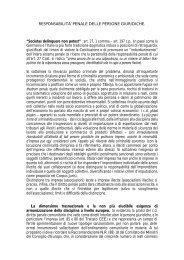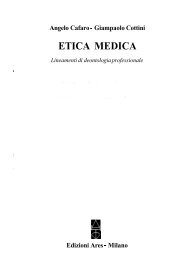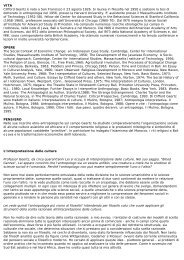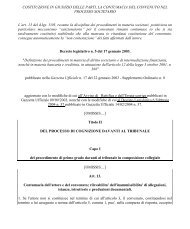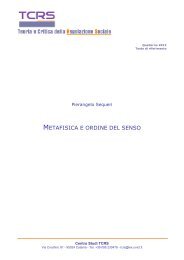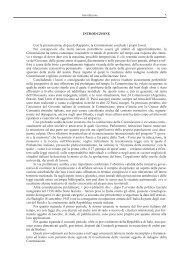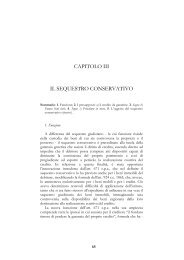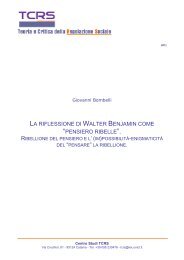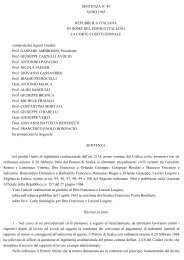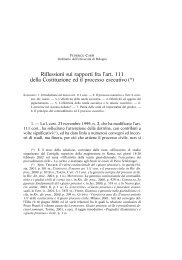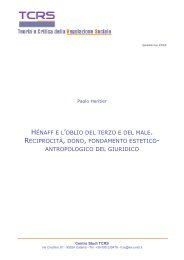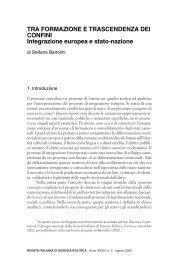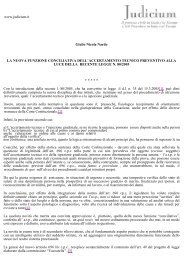FOGLI DI LAVORO per il Diritto internazionale 3 ... - Giurisprudenza
FOGLI DI LAVORO per il Diritto internazionale 3 ... - Giurisprudenza
FOGLI DI LAVORO per il Diritto internazionale 3 ... - Giurisprudenza
You also want an ePaper? Increase the reach of your titles
YUMPU automatically turns print PDFs into web optimized ePapers that Google loves.
212<br />
<strong>FOGLI</strong> <strong>DI</strong> <strong>LAVORO</strong> <strong>per</strong> <strong>il</strong> <strong>Diritto</strong> <strong>internazionale</strong> 3/2008<br />
of data on any specific risks, this notion appears to be in contrast<br />
with the principle of State neutrality in religious matters<br />
established in Kokkinakis v. Greece. In the fifteen years<br />
following 1998 the Court consistently held the view that any<br />
interference in freedom of thought, conscience and religion must<br />
have “regard to what is at stake, namely the need to secure true<br />
religious pluralism, an inherent feature of the notion of a<br />
democratic society” (Kokkinakis, § 31), and that “the role of the<br />
authorities in such circumstances is not to remove the cause of<br />
tension by eliminating pluralism, but to ensure that the<br />
competing groups tolerate each other” (see, for example, Serif<br />
v. Greece, § 53, and Metropolitan Church of Bessarabia v.<br />
Moldova, § 115, amongst other authorities).<br />
In the present case the majority pointed out that “the States<br />
are entitled to verify whether a movement or association carries<br />
on, ostensibly in pursuit of religious aims, activities which are<br />
harmful to the population or to public safety”. However, the<br />
Court has reiterated that the right to freedom of religion<br />
“excludes any discretion on the part of the State to determine<br />
whether religious beliefs or the means used to express such<br />
beliefs are legitimate” (Manoussakis v. Greece, § 47). The<br />
Respondent Government fa<strong>il</strong>ed to demonstrate that the “need to<br />
secure religious pluralism” had been taken into consideration at<br />
any time before or during the impugned information campaign.<br />
There are neither facts, nor even submissions, indicating that<br />
prior to distributing warnings and information using the<br />
impugned expressions the authorities attempted to verify<br />
whether the applicants' activities were “harmful to the<br />
population or to public safety”. In my opinion the observation<br />
that “by providing people with explanations it considered useful<br />
at the time... the German Government ... was aiming to settle a<br />
burning public issue and attempting to warn citizens against<br />
phenomena it viewed as disturbing” (paragraph 94) does not<br />
suffice to conclude that the interference was in pursuit of or<br />
proportional to any of the legitimate aims under Article 9 § 2 of<br />
the Convention.<br />
By accepting the findings of the Federal Constitutional Court<br />
on the legal ground for the information imparted on the motion<br />
of the authorities, the majority seems to interpret the Basic Law<br />
of Germany as one not only <strong>per</strong>mitting, but also requiring State



